1 May 2019
[vc_row full_width=”stretch_row_content_no_spaces” full_height=”yes” css=”.vc_custom_1556706810688{background-image: url(https://www.indexoncensorship.org/wp-content/uploads/2019/01/index-report-online-harassment-cover-banner.png?id=104886) !important;background-position: center !important;background-repeat: no-repeat !important;background-size: contain !important;}”][vc_column][/vc_column][/vc_row][vc_row][vc_column][vc_custom_heading text=”Targeting the messenger: Journalists face an onslaught of online harassment” font_container=”tag:h1|text_align:left” use_theme_fonts=”yes”][vc_custom_heading text=”Mapping Media Freedom correspondents and other journalists discuss their experiences with harassment in the digital realm that has become so commonplace that it is underreported and underestimated.” use_theme_fonts=”yes”][vc_column_text]
“This reporter should be raped.”
This was the response from online trolls to Polish journalist Ada Borowicz after she published the story of an attack on a woman in Italy. Borowicz’s ‘crime’, apparently, was to have published the report without referring to the fact the attackers were alleged to have been migrants. Writing on Facebook Paweł Kukiz, a member of parliament and the leader of the right-wing populist movement Kukiz’15, described Borowicz’s reporting as “scandalous”.
Borowicz, who is also Mapping Media Freedom’s correspondent for Poland, was suspended from duties, and recalled from the assignment. Though her management did not give any explanation, she was told by a colleague that she was being punished on account of Kukiz’s Facebook post. The online threats followed.
When her contract with the government-controlled TVP Info was due to be renewed, an extension was not forthcoming.
Borowicz told Mapping Media Freedom that the story “was supposed to serve as an excuse not to welcome migrants. When my editors realised I wasn’t using harsh words against migrants they weren’t happy. A politician criticised me and then I was surprised to realise how aggressive internet users could be”.
Borowicz’s experience is all too familiar to many journalists, particularly women, throughout the 35 nations that are either European Union members or candidates for entry to the EU. Some 176 cases of online harassment were reported by Mapping Media Freedom correspondents between May 2014 and September 2018 – or one a week. These reports represent just a sliver of the threats against employment, of physical and sexual violence, and of death. Women journalists face malicious threats and are subjected to an extra layer of harassment invoking their gender in a sexually threatening and degrading way. The harassment is often the result of “dog-piling” – as in Borowicz’s case – or the product of an ongoing campaign by a determined troll.[/vc_column_text][vc_single_image image=”106541″ img_size=”full”][vc_row_inner][vc_column_inner width=”1/4″][vc_icon icon_fontawesome=”fa fa-file-pdf-o” color=”black” background_style=”rounded” size=”xl” align=”right”][/vc_column_inner][vc_column_inner width=”3/4″][vc_column_text]
[/vc_column_text][/vc_column_inner][/vc_row_inner][vc_custom_heading text=”Tip of the iceberg” font_container=”tag:h3|text_align:left” use_theme_fonts=”yes”][vc_column_text]The cases in this report represent only the tip of the iceberg. Mapping Media Freedom correspondents – and investigations into online harassment published by Amnesty International, Reporters Without Borders and the International Federation of Journalists – have repeatedly told us that journalists don’t report all the harassment they receive on social media to their unions or the police, which means the number of publicised incidents far from reflects the true magnitude of the problem.
One of the reasons journalists don’t report online harassment is they get used to it and end up seeing it as being part of the job. Ilcho Cvetanoski, an Mapping Media Freedom Balkans correspondent, said: “One continues to report and report incidents to the police. And then at some point one stops reporting them, because it’s easy to end up thinking online harassment is normal.”[/vc_column_text][vc_row_inner][vc_column_inner][vc_custom_heading text=”A wave of abuse” font_container=”tag:h3|text_align:left” use_theme_fonts=”yes”][vc_column_text]Journalists also occasionally feel it’s not safe to speak up about the harassment they have suffered online, fearing it could make things worse and spark a backlash, leading to yet more abuse. Adrien Sénécat, a journalist at Les Décodeurs, Le Monde’s fact-checking section, which engages with readers and verifies stories that have gone viral, says the problem of online harassment is something that concerns him and his team directly. He has thought about reporting incidents – particularly libellous videos – to the police “but feared a Streisand effect so [I] didn’t”.
The online harassment of journalists can take the form of a wave of abuse directed at them. Sénécat likens it to aggressive school bullying. “When you write a story touching certain groups, it prompts very violent reactions which are not limited to the comments of the article but extend to your Twitter mentions, your direct messages, your emails,” he said. “And it can go further – in public forums, for instance. I did a story on bullying in schools, and this [continual] wave of notifications reminded me of how kids would be receiving bullying messages until four in the morning.”
Online harassment can also extend to real life, such as when information about a journalist’s address is published online – “doxing” – and the threats move offline.
Journalists describe feeling surprised at and being unprepared for the violence directed at them, and at the pack mentality of abusive internet users.[/vc_column_text][/vc_column_inner][/vc_row_inner][vc_custom_heading text=”Targeting women” font_container=”tag:h3|text_align:left” use_theme_fonts=”yes”][vc_column_text]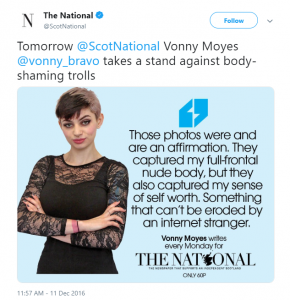 A recent report by Amnesty International confirms women are particularly at risk of being insulted and intimidated on Twitter, and tend to be specifically targeted with an additional layer of violence if they are from a minority group. Women who have a public profile, such as politicians and journalists, suffer insults and threats, with private photos being leaked and published online.
A recent report by Amnesty International confirms women are particularly at risk of being insulted and intimidated on Twitter, and tend to be specifically targeted with an additional layer of violence if they are from a minority group. Women who have a public profile, such as politicians and journalists, suffer insults and threats, with private photos being leaked and published online.
In 2014, the International Women’s Media Foundation (IWMF) reported that two thirds of women polled in an international survey said they had been victims of online harassment.
In 2016, stolen nude photos of Vonny Leclerc (formerly Moyes), a journalist for Scottish newspaper The National, were posted online. She refused to be shamed, and tweeted: “This is the reality of being a female journalist right now. People like you try to use our own bodies against us. All the time.” She then published a nude photo of herself, saying nudity was not an object of shame for her.
Borowicz said: “As a woman, you are always a double target, since you are targeted as a professional and as a woman.”
Meanwhile, Lazara Marinkovic, Mapping Media Freedom’s correspondent in Serbia, said: “For women journalists, people always use the same low blows, based on looks, calling [them whores].”[/vc_column_text][vc_custom_heading text=”Toxic environments” font_container=”tag:h3|text_align:left” use_theme_fonts=”yes”][vc_column_text]When describing the media landscape in countries where there are large numbers of online harassment cases against journalists, our correspondents talk about toxic and polarised environments and of media landscapes largely controlled by governments (such as those in Poland and Serbia).
Marinkovic said: “Calling journalists, NGO workers or whoever is speaking critically about the government, traitors is a very common thing in Serbia. There is a very toxic environment in the media and on social media. There is a mob media mentality. I feel it’s getting much worse.”
She added: “Our ruling party has paid an army of bots to comment. Even the so-called democratic parties hire people to support their agenda online. They usually write positive comments [under pro-government articles] or follow a signal after a politician attacks a member of the opposition.”
Several of the cases on our database started with politicians abusing journalists online before continuing with media outlets running smear campaigns against them, and internet users perpetuating the abuse.[/vc_column_text][vc_custom_heading text=”Impunity” font_container=”tag:h3|text_align:left” use_theme_fonts=”yes”][vc_column_text]Cvetanoski believes a sense of impunity is one of the main reasons online harassment is happening.
“It’s quite easy to harass someone online. People think it’s a safe way to threaten someone,” he said. For example, in August 2018, a satirical comedian on Croatian TV received a death threat on Facebook, and was told “I know where and when you travel” and “You will get one in the back of the head, too, I swear”. When the police discovered that the harasser was a man from Split, the suspect confessed and said sorry, but he also expressed surprised that the police had managed to find him.
Journalists wanting to report online harassment often struggle with a lack of support or preparedness from online platforms, online publications and the police.
Sénécat points at Twitter’s failure to take action. “There’s a problem with Twitter, which doesn’t consider threats are threats unless people are saying ‘I am going to kill you’,” he said.
Meanwhile, referring to Serbia, Marinkovic said: “We have this prosecution office for online harassment. You can report, but they have so many cases and so many other priorities. When people report something they have to bring printed copies of the threats. It’s hard to picture how they operate.”[/vc_column_text][vc_custom_heading text=”Silencing journalists?” font_container=”tag:h3|text_align:left” use_theme_fonts=”yes”][vc_column_text]Online harassment can be effective in silencing journalists. When asked whether online harassment has impacted his work and that of his colleagues, Sénécat said: “We get intimidated by these communities. I notice it among my colleagues and me. Either you start battling with these trolls, antagonising them and answering them, [even though] this is not a rational discussion that can be resolved by a conversation, or you get intimidated, scared of writing about certain topics.
“For instance, if you write about Ulcan [a Franco-Israeli Zionist activist who repeatedly targets journalists whose views he disagrees with], you’ll be scared he’ll end up calling your family, causing your dad to have a heart attack, and you’re aware that writing about certain topics will mean you receive a lot of insults in your inbox.”
Across Europe, journalists are aware that reporting on certain topics is likely to spark online (and possibly offline) harassment against them. These sensitive themes include corruption (such as the mishandling of European funds in Bulgaria, which sparked harassment against investigative website Bivol), organised crime, women’s issues, toxic masculinity and online abuse (journalists reporting on trolling are often targeted), LGBT issues, the migrant crisis (in Greece, journalists reporting on the issue have been repeatedly targeted by supporters of the far-right Golden Dawn party), histories of conflicts (such as the 1990s Balkans war), and the far-right.[/vc_column_text][vc_custom_heading text=”Nadia Daam – a turning point in France” font_container=”tag:h3|text_align:left” use_theme_fonts=”yes”][vc_column_text]
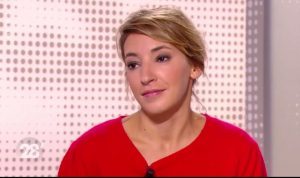
Nadia Daam
The Nadia Daam case in France was seen as a turning point for online harassment cases. It showed that what is illegal offline is also illegal online.
In November 2017 Daam was subjected to an online harassment campaign after a broadcast on Europe 1 radio in which she discussed online forum Blabla 18-25. The users of the forum had flooded a phone number created by two activists keen to fight sexual harassment. Daam called the forum the “internet’s bin of non-recyclable trash”.
Following the broadcast, Daam was targeted on social media – particularly on Twitter. Libération reported that this abuse included pornographic insults, death threats and threats to her child. Her email address was used to subscribe her to pornographic and paedophile websites. There was also an overnight attempt to break into her house.
Daam published the threats she had received on her Twitter account. Two days later, Europe 1 announced she was suing. After a trial in July 2018, two men were given six-month suspended jail sentences and fined €6,000 for threatening Daam online. A third person threatened her and was given a six-month suspended sentence.
“A trial is already a victory,” the journalist said. “Online harassment is not bound to stop tomorrow but the message this trial is sending is we are able to track down the abusers.”[/vc_column_text][vc_custom_heading text=”Adrien Sénécat – establishing boundaries for online presence” font_container=”tag:h3|text_align:left” use_theme_fonts=”yes”][vc_column_text]
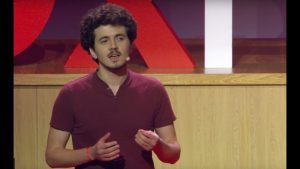
Adrien Sénécat
Adrien Sénécat is adamant that more needs to be done to prepare journalists on how to avoid online harassment.
“This could be talked about in journalism schools. It could be something that outlets tell you when you start a job with them. I always tell students in journalism school to be careful about what can be found about them online,” he said.
After suffering online harassment, he changed his behaviour, reducing his online presence and protecting his private life.
“I’ve deactivated notifications on Twitter,” he said. “Notifications are bad. There’s an accumulation effect. Doing this takes a weight off. You start taking some distance from Twitter and feeling better.”
He also reduced the information on him available online: “I’ve made sure my phone number was unlisted [and] that my address couldn’t be found online. I don’t put photos of my son on Facebook. I’ve changed a lot of things in my behaviour.”
It has also led him to reconsider his priorities as a journalist, which he says are not about building up a public profile on social media and becoming a celebrity but writing stories that start a debate on his publication’s website. He said: “We should start a better conversation about this. Our editors consider we need to write stories but don’t necessarily need to be on Twitter a lot. Twitter is not the space that’s the most important. Spending too much time on it distorts your perspective. Twitter is a space that has been colonised by hordes of malevolent internet users. For me, spending more than one hour on Twitter a day is harmful.”[/vc_column_text][vc_row_inner][vc_column_inner width=”1/2″][vc_column_text]
About this report
This report is part of a series based on data submitted to Mapping Media Freedom. This report reviewed 162 incidents involving investigative journalists from the 35 countries in or affiliated with the European Union between 1 May 2014 and 30 September 2018.
Mapping Media Freedom identifies threats, violations and limitations faced by media workers in 43 countries — throughout European Union member states, candidates for entry and neighbouring countries. The project is co-funded by the European Commission and managed by Index on Censorship as part of the European Centre for Press and Media Freedom (ECPMF).
Index on Censorship is a UK-based nonprofit that campaigns against censorship and promotes freedom of expression worldwide. Founded in 1972, Index has published some of the world’s leading writers and artists in its award-winning quarterly magazine, including Nadine Gordimer, Mario Vargas Llosa, Samuel Beckett and Kurt Vonnegut. Index promotes debate, monitors threats to free speech and supports individuals through its annual awards and fellowship program.
[/vc_column_text][/vc_column_inner][vc_column_inner width=”1/2″][vc_column_text]
Acknowledgements
AUTHOR Valeria Costa-Kostritsky
EDITING Adam Aiken, Sean Gallagher, Ryan McChrystal and Jodie Ginsberg with contributions by Joy Hyvarinen, Paula Kennedy and Mapping Media Freedom correspondents: João de Almeida Dias, Adriana Borowicz, Ilcho Cvetanoski, Jonas Elvander, Amanda Ferguson, Dominic Hinde, Investigative Reporting Project Italy, Linas Jegelevicius, Juris Kaza, David Kraft, Lazara Marinkovic, Fatjona Mejdini, Mitra Nazar, Silvia Nortes, Platform for Independent Journalism (P24), Katariina Salomaki, Zoltan Sipos, Michaela Terenzani, Pavel Theiner, Helle Tiikmaa, Christina Vasilaki, Lisa Weinberger
DESIGN Matthew Hasteley
[/vc_column_text][/vc_column_inner][/vc_row_inner][vc_row_inner][vc_column_inner width=”1/4″][vc_single_image image=”106454″ img_size=”full”][/vc_column_inner][vc_column_inner width=”1/4″][vc_single_image image=”106452″ img_size=”full”][/vc_column_inner][vc_column_inner width=”1/4″][vc_single_image image=”106450″ img_size=”full”][/vc_column_inner][vc_column_inner width=”1/4″][vc_single_image image=”106451″ img_size=”full”][/vc_column_inner][/vc_row_inner][/vc_column][/vc_row]
30 Apr 2019 | Ukraine, Ukraine Incident Reports
[vc_row][vc_column][vc_column_text]
Index on Censorship’s Monitoring and Advocating for Media Freedom project tracks press freedom violations in five countries: Azerbaijan, Belarus, Russia, Turkey and Ukraine. Learn more.
[/vc_column_text][/vc_column][/vc_row][vc_row][vc_column][vc_row_inner][vc_column_inner][vc_custom_heading text=”5 Incidents” use_theme_fonts=”yes”][/vc_column_inner][/vc_row_inner][vc_column_text]
President of Ukraine asks security service to check 112-Ukraine and NewsOne as possible threats to national security
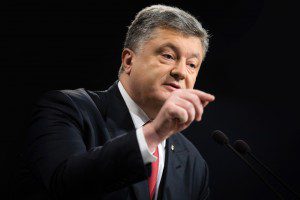 16 April 2019 – “The Verkhovna Rada adopted a resolution on the risks and threats to national security that come from two TV channels. Before addressing this issue, I commissioned a law enforcement agency that is responsible for national security in Ukraine, the SBU, to urgently check the information of the Verkhovna Rada,” president Petro Poroshenko said regarding the 112-Ukraine TV channel, answering a question regarding his plans to consider a petition in defense of the TV channels 112-Ukraine and NewsOne, which got over 25 thousand signatures.
16 April 2019 – “The Verkhovna Rada adopted a resolution on the risks and threats to national security that come from two TV channels. Before addressing this issue, I commissioned a law enforcement agency that is responsible for national security in Ukraine, the SBU, to urgently check the information of the Verkhovna Rada,” president Petro Poroshenko said regarding the 112-Ukraine TV channel, answering a question regarding his plans to consider a petition in defense of the TV channels 112-Ukraine and NewsOne, which got over 25 thousand signatures.
Poroshenko said that as soon as the check is completed, the TV channels will be provided with the results, and will be able to provide comments that will be taken into consideration.
Link(s): https://interfax.com.ua/news/election2019/581252.html
https://www.pravda.com.ua/rus/news/2019/04/16/7212440/
Categories: Legal Measures
Source of violation: Government/State Agency/Public official(s)/Political party, Police/State security
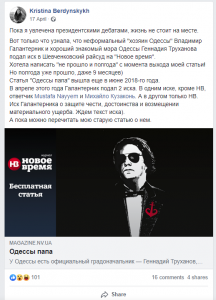 Novoye Vremya reports that there is another complaint filed against it
Novoye Vremya reports that there is another complaint filed against it
17 April 2019 – Businessman Volodymyr Halanternik filed a court complaint on the protection of honour and dignity against Novoye Vremia, a weekly magazine, journalist Khrystyna Berdynskyh posted on Facebook.
An informal “master of Odessa” Volodymyr Halanternik and a good acquaintance of the mayor of Odessa Gennady Trukhanov filed a complaint against Novoye Vremia weekly, she wrote. The journalist added that her article on Volodymyr Galanternik was published in June 2018. In her article Berdynskyh reported that Halanternik had a significant impact on politics and business in Odessa.
Link(s):
https://www.facebook.com/kristina.berdinskikh/posts/10158735452136164
https://imi.org.ua/news/u-novomu-vremeni-povidomyly-shcho-proty-nykh-podaly-shche-odyn-sudovyy-pozov/
https://detector.media/infospace/article/166555/2019-04-17-proti-novogo-vremeni-podali-shche-odin-pozov-do-sudu-berdinskikh/
Categories: Subpoena / Court Order/ Lawsuits
Source of violation: Known private individual(s)
Journalist beaten up by local politician in Odessa
16 April 2019 — Bogdan Osinskiy, Gromadske Slidstvo outlet correspondent and editor for Megafon website, was beaten up near a temple by Odessa regional council deputy Roman Senik and his mother. The journalist fell to the ground in the crowd, and Senik hit him in the face with his feet. The police intervened, but Senik’s mother attacked the journalist in the presence of the officers, hitting him multiple times, and Senik pushed a phone out of the journalist’s hands and smashed it.
Link(s): https://www.048.ua/news/2367344/draka-pod-hramom-deputat-vmeste-s-mamoj-pobil-zurnalista
https://dumskaya.net/news/konflikt-vokrug-hrama-na-pastera-deputat-napal-n-097828/
Categories: Physical Assault/Injury, Attack to Property
Source of violation: Government/State Agency/Public official(s)/Political party, Known private individual(s)
Head of Russian news agency office in Ukraine goes on trial for treason
4 April, 2019 — Prosecutors have accused Kirill Vyshinsky, the head of Russia’s state-run RIA Novosti’s office in Ukraine, of publishing “anti-Ukrainian” articles and materials at the beginning of his treason trial in the Kyiv court. The Podil District Court began the trial on 4 April, almost a year after the 52-year-old was detained by the Ukrainian Security Service (SBU) amid accusations that RIA Novosti Ukraine was participating in a “hybrid information war” waged by Russia against Ukraine. After hearing the prosecutors’ indictment, the court adjourned until April 15th. SBU officials have said Vyshinsky, who at the moment of his arrest had dual Russian-Ukrainian citizenship, received financial support from Russia via other media companies registered in Ukraine in order to disguise links between RIA Novosti Ukraine and Russian state media giant Rossia Segodnya. They also said he was receiving some 53,000 euros (about $60,000) a month from Russian sources for his work, and that the money was sent to him through Serbia. According to the SBU, Vyshinsky was preparing reports at Moscow’s request that sought to justify the seizure of Ukraine’s Crimean Peninsula by Russia in 2014. Vyshinsky faces up to 15 years in prison if found guilty of the charges against him.
Update: 15 April 2019 – The prosecutor’s office accused Vyshinsky on the basis of publication of 72 “anti-Ukrainian” articles, Radio Liberty reported. This was announced by the prosecutors when they announced the indictment in Podilsky district court of Kyiv. Prosecutors stated that these articles were posted by Vyshinsky between 2014 and 2018. According to the prosecutors, the materials contained “false, biased information about Ukraine, the Ukrainian authorities and the army and refuted the Russian aggression against Ukraine.” The prosecution also believes that these materials “justify the possible separation of certain regions of Donetsk and Luhansk regions from Ukraine”.
Update: 7 May 2019 — Podilsky District Court of Kyiv extended arrest to Vyshinsky until 22 July 2019, Radio Liberty reported. The prosecutor demanded that the court leave Vyshinsky arrested for another two months. He substantiated this with the fact that the defendant has Russian citizenship and can escape to Russia. The defense spoke against the extension of the arrest and requested that Vyshinsky be released under house arrest.
Link(s): https://www.radiosvoboda.org/a/news-vyshynskomu-zachytuyut-obvynuvachennya/29882290.html
https://www.radiosvoboda.org/a/news-vyshynskiy-ria-novosti/29861706.html
https://www.rferl.org/a/ukraine-vyshinsky-ria-novosti-ukraine-treason-trial/29861826.html
Categories: Arrest/ Detention, Criminal Charges/Fines/Sentences
Source of violation: Police/State security, Court/Judicial
Journalist assaulted by transport company employee
2 April 2019 — Zhytomyr.Life online outlet crew was assaulted by local transport company employee in Zhytomyr. The man attacked cameraman Vasyl Homyuk and twice tried to knock the camera out of his hands.
Link(s): https://detector.media/community/article/166064/2019-04-03-u-zhitomiri-zhurnalisti-zayavlyayut-pro-napad-u-marshruttsi/
https://zhitomir.life/10654-u-zhitomiri-predstavnik-pereviznika-napav-na-zhurnalistiv-video.html
Categories: Attack to Property
Source of violation: Known private individual(s)[/vc_column_text][/vc_column][/vc_row][vc_row][vc_column][vc_basic_grid post_type=”post” max_items=”4″ element_width=”6″ grid_id=”vc_gid:1575991602847-ad26670e-749a-1″ taxonomies=”8996″][/vc_column][/vc_row]
29 Apr 2019
[vc_row full_width=”stretch_row_content_no_spaces” full_height=”yes” css=”.vc_custom_1556538283972{background-image: url(https://www.indexoncensorship.org/wp-content/uploads/2019/04/index-report-2018-legislation-bannerv2.png?id=106464) !important;background-position: center !important;background-repeat: no-repeat !important;background-size: contain !important;}”][vc_column][/vc_column][/vc_row][vc_row][vc_column][vc_custom_heading text=”Targeting the messenger: Journalists ensnared by national security legislation” font_container=”tag:h1|text_align:left” use_theme_fonts=”yes”][vc_custom_heading text=”As security – rather than protecting rights and freedoms – becomes the top priority of governments worldwide, laws have increasingly been used to obstruct the work of media professionals in the 35 countries that are in or affiliated with the European Union (EU35).” use_theme_fonts=”yes”][vc_column_text]Index on Censorship’s Mapping Media Freedom project, which monitors violations against media professionals in 43 countries, has received 269 reports of cases where national laws in the EU35 have been obstacles to media freedom between 2014 and 2018.
This includes everything from the hundreds of journalists jailed in Turkey following the 2016 failed coup to the seizure of a BBC journalist’s laptop in the United Kingdom, as well as Spain’s Citizens Security Law.
Mapping Media Freedom’s data highlights that the misuse of national security legislation to silence government critics is growing. Of the 269 cases, 67 happened in 2018 and 77 in 2017. There were 81 reports in 2016, 34 in 2015 and only 10 in 2014.
The increase in incidents may be the result of rapidly changing political contexts in individual countries such as Turkey, but it also reflects a continental trend, as incidents have increased in countries including the UK, France, Spain and Germany.
Mapping Media Freedom’s numbers reflect only what has been reported to the platform. We have found that journalists under-report incidents they consider minor, commonplace or part of the job, or where they fear reprisals. In some cases, Mapping Media Freedom correspondents have identified incidents retrospectively as a result of comments on social media or reports appearing only after similar incidents have come to light.
EU governments in particular need to be mindful that loosely-drafted national security laws are often copied by far more restrictive regimes to support their repression of critical media.[/vc_column_text][vc_single_image image=”106465″ img_size=”full”][vc_row_inner][vc_column_inner width=”1/4″][vc_icon icon_fontawesome=”fa fa-file-pdf-o” color=”black” background_style=”rounded” size=”xl” align=”right”][/vc_column_inner][vc_column_inner width=”3/4″][vc_column_text]
[/vc_column_text][/vc_column_inner][/vc_row_inner][vc_custom_heading text=”Anti-terror legislation” font_container=”tag:h3|text_align:left” use_theme_fonts=”yes”][vc_column_text]In light of recent terrorist attacks in Europe, governments have passed stricter counter-terrorism laws. However, the measures have been cynically exploited to criminalise government critics or silence critical media.
Turkey is an egregious case. This phenomenon started small where dismissive official rhetoric was aimed at small segments – such as Kurdish journalists – but over time expanded to extinguish whole newspapers or television networks that espoused critical viewpoints on government policy.
After the 2016 coup attempt, the trend intensified further. Hundreds of journalists have been arrested, dismissed from their jobs or sent to prison under state of emergency decrees and anti-terror laws passed by Recep Tayyip Erdoğan’s government.
In one case, in July 2018, three pro-Kurdish newspapers and a television station were closed down by order of an emergency decree. Under the decree, all assets, rights and documents and the debt owed to the shuttered media institutions and associations were transferred to the treasury.
In many cases, critical media companies and dissenting journalists are charged under the anti-terror act for spreading “propaganda for a terrorist organisation”. Many are charged for supporting peace with Kurdish separatists or just for expressing solidarity with others who face government reprisals. For example, in January 2018, five journalists — Ragıp Duran, Hüseyin Aykol, Mehmet Ali Çelebi, Ayşe Düzkan and writer Hüseyin Bektaş — were sent to prison for participating in a solidarity campaign for the shuttered pro-Kurdish Özgür Gündem newspaper.
But the trend toward the criminalisation of journalism that makes governments uncomfortable has spread beyond Turkey.
In 2015, five websites were blocked without judicial oversight in France. The administrative blocking came from the interior ministry on grounds that they “incite or defend terrorism”, under the Terrorism Act.
Even jokes can land journalists in trouble. French police searched the office of community station Radio Canut in Lyon in 2016 and seized the recording of a radio programme after two presenters were accused of “incitement to terrorism”. They had been talking about protests by police officers which had been taking place in France at the time. One of the presenters was put under judicial supervision and forbidden to host the radio programme until he appeared in court.
In Spain, comedian Facu Díaz was taken to court in 2015 for a satirical sketch from his online comedy show. The satirist faced charges under a law that criminalises the “glorification of terrorism” with punishment of up to two years in prison.
Governments are also using terror laws to spy on journalists. In 2014, police in the UK admitted they had used powers under terror legislation to obtain the phone records of Tom Newton Dunn, political editor of The Sun newspaper, to investigate the source of a leak in a political scandal. Police used powers under the Regulation of Investigatory Powers Act, which circumvents another law that requires police to have approval from a judge to get disclosure of journalistic material. In September 2018, the European Court of Human Rights ruled that the UK’s mass surveillance regime violated human rights.
But the Counter-Terrorism and Border Security Bill – a piece of legislation which critics argue will have a significant negative impact on media freedom in addition to other freedoms – continued its passage through Parliament, and has already been passed by the House of Commons. The final hearing in the House of Lords took place on 15 January 2019. It was sent back to the House for further consideration after some amendments.
The bill would criminalise publishing pictures or video clips of items such as clothes or flags in a way that raises “reasonable suspicion” that the person doing it is a member or supporter of a terrorist organisation. It would also criminalise watching online content that is likely to be helpful to a terrorist. No terrorist intent is required. The offence would carry a prison sentence of up to 15 years.
Parliament’s own human rights watchdog, the Joint Committee on Human Rights, has recommended that the former clause be withdrawn or amended because it “risks a huge swathe of publications being caught, including… journalistic articles”. The government has not accepted the recommendation.
“The bill would introduce wide-ranging new border security powers,” said Joy Hyvarinen, head of advocacy at Index on Censorship. “A journalist could be stopped without any suspicion of wrongdoing. It would be an offence not to answer questions or hand over materials, with no protection for confidential sources.”[/vc_column_text][vc_custom_heading text=”Law enforcement – security measures” font_container=”tag:h3|text_align:left” use_theme_fonts=”yes”][vc_column_text]Measures designed to protect law enforcement officers or increase their powers have also become a threat for journalists.
These measures are sometimes the result of a state of emergency declared in a country. While the state of emergency in Turkey after the 2016 coup attempt is a prime example, the same has happened elsewhere.
In France, measures declared after the 2015 terrorist attacks in Paris were used to ban photographer NnoMan from covering a protest in the city in 2016. The police justified the decree by the young man’s presence “at several demonstrations against police violence or the proposed labour law” which ended up in violent disorders, but failed to mention that NnoMan had a press card.
In other cases, the threat comes from ordinary laws. Spain’s Citizens Security Law punishes public protests in front of government buildings and the “unauthorised use” of images of law enforcement authorities or police.
In 2017, a Spanish police union filed a lawsuit against Mónica Terribas, a journalist for Catalunya Rádio, accusing her of “favouring actions against public order”. The union claimed she urged citizens in Catalonia to report on police movements during the referendum on independence, and that such information could help terrorists, drug dealers and other criminals.
The passing of a similar law has raised eyebrows in Bavaria, where the state parliament granted law enforcement broad new powers to act without “concrete suspicion” in May 2018. The law gives police new powers to access mobile phones, computers and cloud-based data. Law enforcement officers are allowed to amend or delete the information they recover under the legislation.
Provisions also include extending “preventative detention” powers where there is fear of public disorder, under which police can detain people for up to three months – previously two weeks – without prior judicial approval. Under the legislation, detainees can ask judges to review the legality of their detention, but prisoners must bring the cases themselves and have no right to state-provided lawyers for this purpose.[/vc_column_text][vc_custom_heading text=”Official secrets – leaks” font_container=”tag:h3|text_align:left” use_theme_fonts=”yes”][vc_column_text]Official secrets acts are another way in which legislation can obstruct media freedom.
In May 2017, six journalists were called to testify by authorities in the German state of Niedersachsen after the publication of articles that contained leaked information about law enforcement errors made during terror investigations. They were told they would face large fines if they refused to testify. The German Journalists Association called the procedure “intimidation” and “a risk for source protection”.
In the UK, a proposal is being considered that could lead to journalists being jailed for up to 14 years for obtaining leaked official documents. The major overhaul of the Official Secrets Act – to be replaced by an updated Espionage Act – would give courts the power to increase jail terms against journalists receiving official material. The new law, should it get approval, would see documents containing “sensitive information” about the economy fall foul of national security laws for the first time.
Jodie Ginsberg, chief executive of Index on Censorship, said: “It is unthinkable that whistleblowers and those to whom they reveal their information should face jail for leaking and receiving information that is in the public interest.”[/vc_column_text][vc_custom_heading text=”Case studies” font_container=”tag:h3|text_align:left” use_theme_fonts=”yes”][vc_custom_heading text=”Deniz Yücel, Turkey correspondent for Die Welt” font_container=”tag:h3|text_align:left” use_theme_fonts=”yes”][vc_column_text]
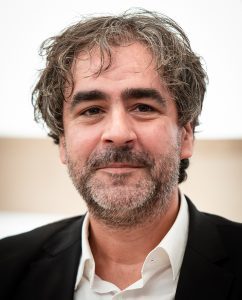
Deniz Yücel
The case of Deniz Yücel epitomises how journalism that is critical to the Turkish government, Erdoğan or their associates is being equated with terrorism.
Yücel, a Turkish-German dual national, was working as a correspondent for German newspaper Die Welt when he was taken into police custody on 17 February 2017, and was formally arrested on 27 February 2017.
He is one of hundreds of journalists arrested in Turkey since the 2016 coup attempt on charges of sedition and “spreading propaganda of a terrorist organisation and inciting the public to hatred and hostility” under the Turkish anti-terror act.
“This law is Turkey’s own Sword of Damocles that the state holds on freedom of expression,” said Özgün Özçer, Turkey correspondent for Mapping Media Freedom. “Journalists regularly face investigations when they report on the army’s crimes, the judiciary’s unfair verdicts, state oppression and so forth.
“Ironically, the propaganda charge is also a tool to allow government propaganda to prevail over the truth. It hides what truly happened and discredits reality to protect the state’s own version of the facts – the real propaganda.”
In Yücel’s case, “spreading propaganda for a terrorist organisation” amounted to a report he wrote about the energy minister after the minister’s email account was hacked by a group of activists. Six Turkish journalists were arrested for the same reason, but tried separately.
Yücel was subject to pre-trial detention until February 2018, when he was released. In the same month, his court case began. Prosecutors are seeking up to 18 years in prison.
Yücel returned to Germany after the intervention of Chancellor Angela Merkel and is being tried in absentia.[/vc_column_text][vc_custom_heading text=”Axier López and Spain’s gag law” font_container=”tag:h3|text_align:left” use_theme_fonts=”yes”][vc_column_text]
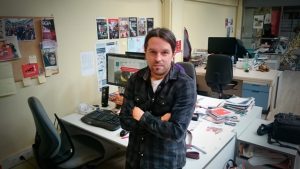
Axier López
In March 2016, Axier López was fined €601 for posting photographs of police making an arrest.
López, a journalist for Basque country magazine Argia, had posted two photos on Twitter of police arresting a woman who had failed to appear in court.
Under the Citizens Security Law 2015 – which critics call the “gag law” – disseminating photos of police officers “that would endanger their safety or that of protected areas or put the success of an operation at risk” can incur in fines of up to €30,000.
According to the People’s Party, which was in power when the law was passed, the aim of the law is to protect officers on duty, but police associations and even citizens’ associations have used it to target journalists. The legislation was introduced after a wave of anti-austerity protests in the country.
“Several journalists have been sanctioned with heavy administrative fines for taking photos at public demonstrations and events,” said Silvia Nortes, Spain correspondent for Mapping Media Freedom. “Others have even suffered judicial measures against investigative journalism, mainly in political corruption cases.”
Although the fine has since been revoked by a Catalan court, López said the law criminalised journalism, and digital newspaper Diagonal wrote: “This is the first time that a journalist is fined by the gag law.”[/vc_column_text][vc_row_inner][vc_column_inner width=”1/2″][vc_column_text]
About this report
This report is part of a series based on data submitted to Mapping Media Freedom. This report reviewed 269 incidents involving investigative journalists from the 35 countries in or affiliated with the European Union between May 2014 and 30 October 2018.
Mapping Media Freedom identifies threats, violations and limitations faced by media workers in 43 countries — throughout European Union member states, candidates for entry and neighbouring countries. The project is co-funded by the European Commission and managed by Index on Censorship as part of the European Centre for Press and Media Freedom (ECPMF).
Index on Censorship is a UK-based nonprofit that campaigns against censorship and promotes freedom of expression worldwide. Founded in 1972, Index has published some of the world’s leading writers and artists in its award-winning quarterly magazine, including Nadine Gordimer, Mario Vargas Llosa, Samuel Beckett and Kurt Vonnegut. Index promotes debate, monitors threats to free speech and supports individuals through its annual awards and fellowship program.
[/vc_column_text][/vc_column_inner][vc_column_inner width=”1/2″][vc_column_text]
Acknowledgements
AUTHOR Alessio Perrone
EDITING Adam Aiken, Sean Gallagher, Ryan McChrystal with contributions by Jodie Ginsberg, Joy Hyvarinen and Paula Kennedy and Mapping Media Freedom correspondents: João de Almeida Dias Adriana, Borowicz, Valeria Costa-Kostritsky, Ilcho Cvetanoski, Jonas Elvander, Amanda Ferguson, Dominic Hinde, Investigative Reporting Project Italy, Linas Jegelevicius, Juris Kaza, David Kraft, Lazara Marinkovic, Fatjona Mejdini, Mitra Nazar, Silvia Nortes, Platform for Independent Journalism (P24), Katariina Salomaki, Zoltan Sipos, Michaela Terenzani, Pavel Theiner, Helle Tiikmaa, Christina Vasilaki, Lisa
Weinberger
DESIGN Matthew Hasteley
[/vc_column_text][/vc_column_inner][/vc_row_inner][vc_row_inner][vc_column_inner width=”1/4″][vc_single_image image=”106454″ img_size=”full”][/vc_column_inner][vc_column_inner width=”1/4″][vc_single_image image=”106452″ img_size=”full”][/vc_column_inner][vc_column_inner width=”1/4″][vc_single_image image=”106450″ img_size=”full”][/vc_column_inner][vc_column_inner width=”1/4″][vc_single_image image=”106451″ img_size=”full”][/vc_column_inner][/vc_row_inner][/vc_column][/vc_row]
18 Apr 2019 | Magazine, News and features, Volume 48.01 Spring 2019
[vc_row][vc_column][vc_custom_heading text=”Responding to violations of media freedom in Hungary has become a conundrum for the EU. With populist parties poised for large gains in the next European election, Sally Gimson explores in the spring 2019 issue of Index on Censorship magazine what the EU could do to uphold free speech in member countries” google_fonts=”font_family:Libre%20Baskerville%3Aregular%2Citalic%2C700|font_style:400%20italic%3A400%3Aitalic”][vc_column_text]
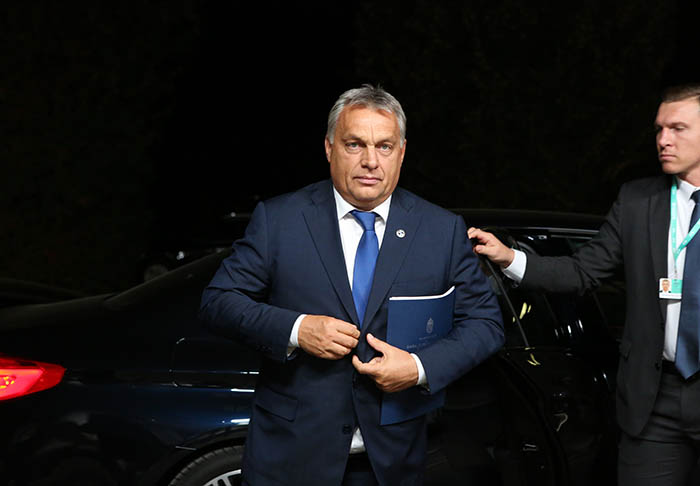
Hungarian prime minister Viktor Orbán. Credit: EU2017EE Estonian Presidency / Flickr
Dutch MEP Judith Sargentini is enemy number one in the eyes of the Hungarian government. The Green politician incurred that government’s anger when she persuaded the European Parliament to the country losing voting rights.
She accused Hungary, among other democratic failings, of not ensuring a free and uncensored press. But since the vote last September, nothing has happened, except that the Hungarian government launched a campaign against her on state television – and she no longer feels safe to travel there.
“[The government] has been spreading so much hate against me, and if the government is spreading hate, what if there is a lunatic around? I’m not taking the risk,” she said.
“The Hungarian government spent 18 million euros on a publicity campaign against me, after I won the vote – with TV commercials and a full-page advertisement with my face on it.” The other vocal critic of Hungary, Belgian Liberal MEP and former Belgian prime minister Guy Verhofstadt, as well as the philanthropist George Soros were targeted in the same campaign.
With the European elections coming up in May 2019, and the possibility of large gains by nationalist, populist parties, the question is what the EU can do to curb freedom of expression violations on its territory.
The problem according to Lutz Kinkel, managing director of the European Centre for Press and Media Freedom, is the EU has no specific competences over media freedom. No country can join the EU without guaranteeing freedom of expression as a basic human right under Article 49 of the Lisbon Treaty. Article 7 is triggered when there is “a clear risk” of a member state breaching EU values. Although this can lead to a country’s voting rights being taken away, to get to that point, all the other EU countries have to agree.
As Camino Mortera-Martinez, a senior research fellow at the think-tank Centre for European Reform in Brussels, said: “Article 7 is never going to work because it is so vague. [All the other] member states are never going to argue to punish another one by suspending voting rights.”
Historian Tim Snyder, author of The Road to Unfreedom, a book about how Russia works to spread disinformation within the West, told Index he thought Hungary should have been thrown out of the EU a long time ago. But, with Britain’s exit from the EU, it is difficult to start expelling countries now.
“The tricky thing about the European Union, and this goes not just for eastern Europe but everyone, is that there might be rules for how you get in, but once you are in the rules are a lot less clear,” he said.
[/vc_column_text][vc_row_inner][vc_column_inner width=”1/4″][vc_icon icon_fontawesome=”fa fa-quote-left” color=”custom” size=”xl” align=”right” custom_color=”#dd3333″][/vc_column_inner][vc_column_inner width=”3/4″][vc_custom_heading text=”It’s like joining a sorority with very strict rules for entering, but when you are there you can misbehave and it is covered up by the group” font_container=”tag:h3|text_align:left” google_fonts=”font_family:Libre%20Baskerville%3Aregular%2Citalic%2C700|font_style:400%20italic%3A400%3Aitalic”][/vc_column_inner][/vc_row_inner][vc_column_text]
[/vc_column_text][vc_column_text]
Hungary is the most prominent country in Europe to put restrictions on media freedom. Not only is public service media directly under government control, and critical journalists have been fired, but the government has also made sure that private media has either been driven out of business or taken over by a few oligarchs close to Prime Minister Viktor Orbán. The only independent media are very small operations, publishing almost exclusively on the internet.
Snyder told Index: “I think Europeans generally made the mistake of thinking that it doesn’t matter if we have one small country which is going the wrong way [and that] Hungary can’t possibly affect others. But the truth is – because it is easier to build authoritarianism than democracy – one bad example does ripple outwards and Hungary isn’t just Hungary and Orbán isn’t just Orbán; they represent a kind of mode of doing things which other people can look to, and individual leaders can say: ‘That’s possible’.”
This is borne out by Index on Censorship’s Mapping Media Freedom project which tracked media freedom in 43 European countries and found patterns that showed countries following Hungary’s example including Poland.
Anita Kőműves is an investigative journalist in Hungary who works for non-profit investigative outlet Átlátszó.hu which won an Index award for digital activism in 2015. She says not only does Brussels do nothing to challenge Hungary’s undermining of the free press but people in the commission are persuaded it is not all that bad.
She said: “Orbán is walking a fine line with Brussels. He knows that he cannot go too far. Whatever happens here, it must be deniable and explainable. Orbán goes to Brussels, or sends one of his henchmen, and he explains everything away. He has bad things written about him every single day in Hungary and nobody is in jail, so everything is fine… everything is not fine. Freedom of speech, the fact that I can write anything I like on the internet and nobody puts me in jail, is not the same as freedom of media when you have a strong media sector which is independent of the government.”
[/vc_column_text][/vc_column][/vc_row][vc_row][vc_column width=”1/4″][vc_icon icon_fontawesome=”fa fa-quote-left” color=”custom” size=”xl” align=”right” custom_color=”#dd3333″][/vc_column][vc_column width=”3/4″][vc_custom_heading text=”I think Europeans generally made the mistake of thinking that it doesn’t matter if we have one small country which is going the wrong way” font_container=”tag:h3|text_align:left” google_fonts=”font_family:Libre%20Baskerville%3Aregular%2Citalic%2C700|font_style:400%20italic%3A400%3Aitalic”][/vc_column][/vc_row][vc_row][vc_column][vc_column_text]
The solution for Brussels, she argues, is not Article 7 but for the EU to use European competition law to challenge the monopoly on media ownership the government and government-backed companies have in Hungary.
Kinkel says that this would be a warning to other countries, such as Bulgaria and Romania, which are trying to control the media in similar ways and in the case of Bulgaria giving EU funds only to government-friendly media.
“Governments try to get hold of public service media: this is one step,” he said. “And the other step is to throw out investors and media they don’t like and to give media outlets to oligarchs who are government-friendly and so on and so on, and to start new campaigns against independent investigative journalists.”
In Poland, the European Commission invoked Article 7 because of the government’s threats to the independence of the judiciary. The government so far controls only the state media but, as journalist Bartosz Wieliński , head of foreign news at the Gazeta Wyborcza newspaper, points out, the government used that state media to hound the mayor of Gdańsk, Paweł Adamowicz, for months before he was assassinated in January this year.
Wieliński believes it was only after Britain voted to leave the EU that countries realised they would face little sanction if they chipped away at freedom of expression. Although the EU did not collapse as they expected, the initial disarray gave them an opportunity to test European mechanisms and find them wanting.
Maria Dahle is chief executive of the international Human Rights House Foundation. She believes financial sanctions could be the way to stop countries from crossing the line, as Poland and Hungary have.
“When allocating funding, it should be conditional,” she said. “If [member states] do violate the rule of law, it has to have consequences … and the consequences should be around financial support.”
But Mortera-Martinez warns if the EU starts punishing countries too much financially, it will encourage anti-EU feeling which could be counter-productive, leading to election wins for populist, nationalist parties. The effect of any populist gains in the May elections concerns Kinkel, also: “What is clear is that when the populist faction grows, they have the right to have their people on certain positions on committees and so on. And this will be a problem… especially for press and media freedom,” he said.
Back at the European Parliament, Sargentini is impatient. “It’s about political will, and the EU doesn’t have it at the moment,” she said. “It’s like joining a sorority [with] very strict rules for entering, but when you are there you can misbehave and it’s covered up by the group.”
[/vc_column_text][/vc_column][/vc_row][vc_row][vc_column][vc_column_text]
Sally Gimson is the deputy editor of Index on Censorship magazine.
Index on Censorship’s spring 2019 issue is entitled Is this all the local news? What happens if local journalism no longer holds power to account?
Look out for the new edition in bookshops, and don’t miss our Index on Censorship podcast, with special guests, on Soundcloud.
[/vc_column_text][/vc_column][/vc_row][vc_row][vc_column width=”1/3″][vc_custom_heading text=”Is this all the local news?” font_container=”tag:h3|text_align:left” link=”url:https%3A%2F%2Fwww.indexoncensorship.org%2F2018%2F12%2Fbirth-marriage-death%2F|||”][vc_column_text]The spring 2019 issue of Index on Censorship magazine asks Is this all the local news? What happens if local journalism no longer holds power to account?
With: Libby Purves, Julie Posetti and Mark Frary[/vc_column_text][/vc_column][vc_column width=”1/3″][vc_row_inner][vc_column_inner][vc_single_image image=”105481″ img_size=”full” onclick=”custom_link” link=”https://www.indexoncensorship.org/2018/12/birth-marriage-death/”][/vc_column_inner][/vc_row_inner][/vc_column][vc_column width=”1/3″][vc_custom_heading text=”Subscribe” font_container=”tag:h3|text_align:left”][vc_row_inner][vc_column_inner][vc_column_text]In print, online. In your mailbox, on your iPad.
Subscription options from £18 or just £1.49 in the App Store for a digital issue.
Every subscriber helps support Index on Censorship’s projects around the world.
 SUBSCRIBE NOW[/vc_column_text][/vc_column_inner][/vc_row_inner][/vc_column][/vc_row][vc_row][vc_column][vc_column_text]This article has been updated on 18 April 2019 to reflect that the name of organisation Lutz Kinkel works for had been written incorrectly. The article read “European Centre for Press and Media Reform”, when it should have read “European Centre for Press and Media Freedom”.[/vc_column_text][/vc_column][/vc_row]
SUBSCRIBE NOW[/vc_column_text][/vc_column_inner][/vc_row_inner][/vc_column][/vc_row][vc_row][vc_column][vc_column_text]This article has been updated on 18 April 2019 to reflect that the name of organisation Lutz Kinkel works for had been written incorrectly. The article read “European Centre for Press and Media Reform”, when it should have read “European Centre for Press and Media Freedom”.[/vc_column_text][/vc_column][/vc_row]
 A recent report by Amnesty International confirms women are particularly at risk of being insulted and intimidated on Twitter, and tend to be specifically targeted with an additional layer of violence if they are from a minority group. Women who have a public profile, such as politicians and journalists, suffer insults and threats, with private photos being leaked and published online.
A recent report by Amnesty International confirms women are particularly at risk of being insulted and intimidated on Twitter, and tend to be specifically targeted with an additional layer of violence if they are from a minority group. Women who have a public profile, such as politicians and journalists, suffer insults and threats, with private photos being leaked and published online.


 16 April 2019 – “The Verkhovna Rada adopted a resolution on the risks and threats to national security that come from two TV channels. Before addressing this issue, I commissioned a law enforcement agency that is responsible for national security in Ukraine, the SBU, to urgently check the information of the Verkhovna Rada,” president Petro Poroshenko said regarding the 112-Ukraine TV channel, answering a question regarding his plans to consider a petition in defense of the TV channels 112-Ukraine and NewsOne, which got over 25 thousand signatures.
16 April 2019 – “The Verkhovna Rada adopted a resolution on the risks and threats to national security that come from two TV channels. Before addressing this issue, I commissioned a law enforcement agency that is responsible for national security in Ukraine, the SBU, to urgently check the information of the Verkhovna Rada,” president Petro Poroshenko said regarding the 112-Ukraine TV channel, answering a question regarding his plans to consider a petition in defense of the TV channels 112-Ukraine and NewsOne, which got over 25 thousand signatures.  Novoye Vremya reports that there is another complaint filed against it
Novoye Vremya reports that there is another complaint filed against it

